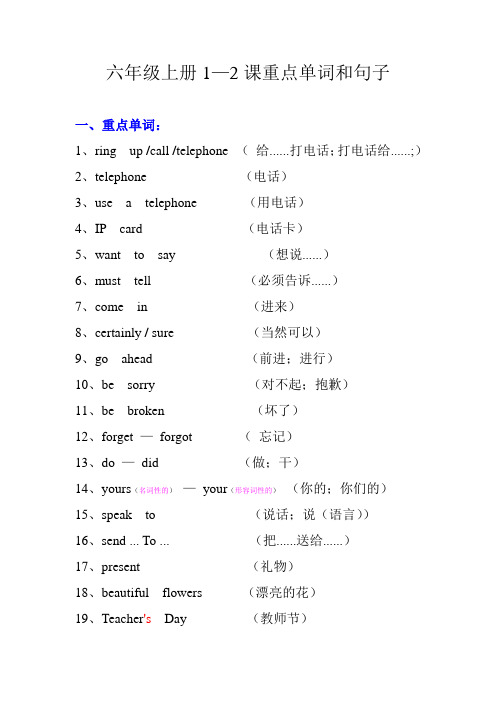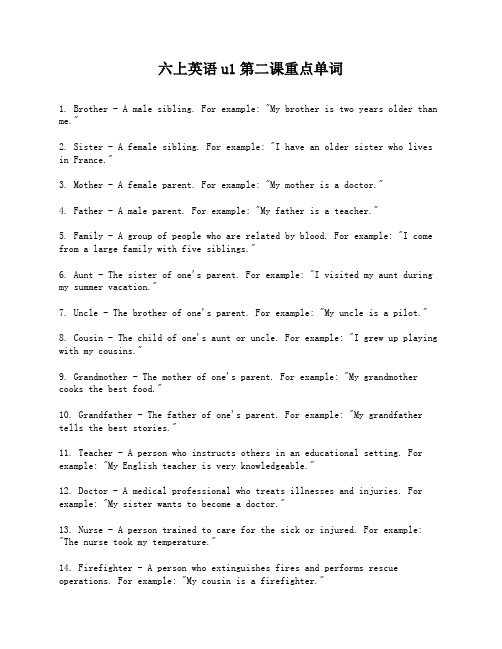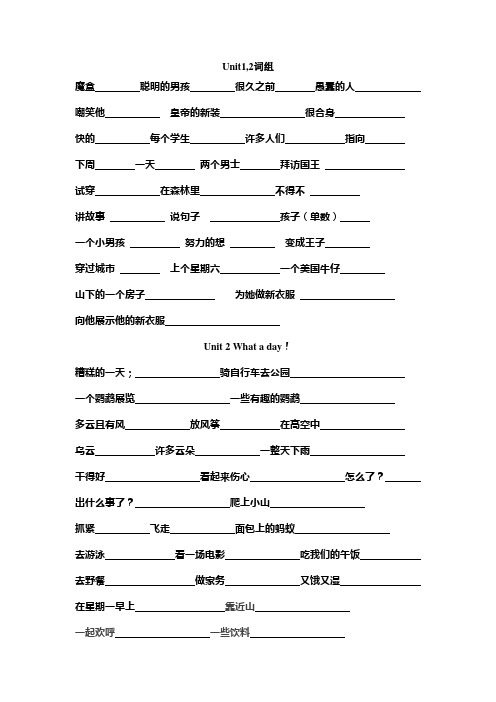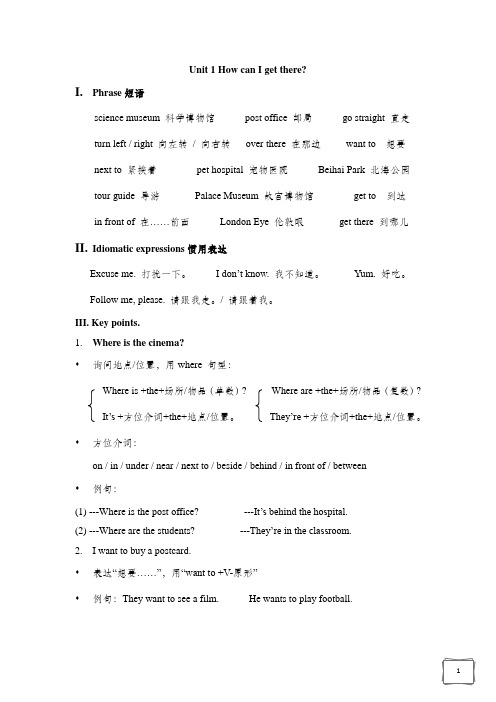六年级 上u1(2)词组与对话
- 格式:doc
- 大小:53.50 KB
- 文档页数:3

六年级上册英语知识点总结Unit 1 How can I get there一:重点单词和短语Science科学museum博物馆post office邮局bookstore书店cinema电影院hospital医院London Eye伦敦眼stomach胃crossing十字路口turn left向左转turn right向右转next to紧挨着/与...相邻far from(离...远) near在...附近behind(在...后面)in front of(在...前面)between…and…(在...和...之间)go straight=walk straight直走二:按要求写单词:hot(反义词)cold cool(反义词)warm too(同音词)to/two can not(缩写)can’t????? right(反义词)left/wrong buy(同音词)by/bye sea(同音词)see first(基数词)one???? four(序数词)fourth did (原形)do /does three(序数词)third give(过去式)gave三:重点句型分析1.?Where is the museum shop此问句是由特殊疑问词where 引导的一个特殊疑问句,where意为“在哪里,到哪里”,用来询问地点,放在句子的开头。
询问“某人或某物在哪里”的基本句型是:“ Where +is/are+ 主语?”,where is 后接名词或代词的单数形式,where are 后接名词或代词的复数形式。
表示地点的词:museum博物馆, post office邮局, bookstore书店, cinema电影院, hospital医院restaurant 餐馆bank银行bus stop公交车站lake湖library图书馆zoo动物园school学校park公园garden 花园hotel旅馆2.?It’s near the door.?此句中near是表示位置的介词,意为“旁边,附近” ,其同义句是:It’s next to the door.它在门的旁边。

六年级上册1—2课重点单词和句子一、重点单词:1、ring up /call /telephone (给......打电话;打电话给......;)2、telephone (电话)3、use a telephone (用电话)4、IP card (电话卡)5、want to say (想说......)6、must tell (必须告诉......)7、come in (进来)8、certainly / sure (当然可以)9、go ahead (前进;进行)10、be sorry (对不起;抱歉)11、be broken (坏了)12、forget —forgot (忘记)13、do —did (做;干)14、yours(名词性的)—your(形容词性的)(你的;你们的)15、speak to (说话;说(语言))16、send ... To ... (把......送给......)17、present (礼物)18、beautiful flowers (漂亮的花)19、Teacher's Day (教师节)20、come out to play (出来玩儿)二、重点句子:1、A:May I use the telephone? (我可以用一下电话吗?) B:Yes,please. / Certainly / Sure (好的,请吧/ 当然可以)2、Who will you ring up? (你给谁打电话?)3、I want to say "Happy birthday!" to him.(我想对她说声“生日快乐”。
)4、You are really a nice boy ! (你真是个好孩子!)5、May I speak to Li Shan , please? (我可以请李珊接电话吗)6、This is Li Shan speaking . (我就是李珊。

6A U1 The king's new clothes ---story time【知识积累】知识点1、重点单词1.long long ago 很久以前ago adv.以前(与一般过去时连用)many years ago 很多年以前;a week/month/year ago 一周/月/年以前例: I went to school by bike a week ago. 我一周以前骑自行车上学。
2.magic adj.有魔力的,神奇的these magic clothes 这些神奇的衣服【词性拓展】magic n.魔术,魔法例:It’s like magic.像魔术一样。
3.clever adj.聪明的反义词:foolish愚蠢的例:Lily is a clever girl. 莉莉是一个聪明的女孩。
4.foolish adj.愚蠢的a foolish thing一件愚蠢的事(反义词)clever 聪明的【词性拓展】fool n.蠢人;傻子例:You’re foolish. It’s not a true tiger.你真蠢。
那不是一只真的老虎5.through prep.穿过walk through走过run through 跑过注意:through表示从物体内部穿过,且词性为介词,不可单独使用,必须与动词在一起使用。
例:He always walks through the forest.ugh v.大笑第三人称单数:laughs 现在分词:laughing过去式:laughed 反义词:cry 短语:laugh at 嘲笑例:He always laughs.他总是大笑。
Don’t laugh at the poor. 不要嘲笑穷人。
注意:laugh单独使用时,表示“大笑,发笑”,如表示“笑某人或某物”时,必须要加上介词to,组成laugh at sb/sth 短语【辨析】laugh是出声的笑,而且伴有面部表情和动作等;而smile是微笑,常常是无声的笑。

六上英语u1第二课重点单词1. Brother - A male sibling. For example: "My brother is two years older than me."2. Sister - A female sibling. For example: "I have an older sister who lives in France."3. Mother - A female parent. For example: "My mother is a doctor."4. Father - A male parent. For example: "My father is a teacher."5. Family - A group of people who are related by blood. For example: "I come from a large family with five siblings."6. Aunt - The sister of one's parent. For example: "I visited my aunt during my summer vacation."7. Uncle - The brother of one's parent. For example: "My uncle is a pilot."8. Cousin - The child of one's aunt or uncle. For example: "I grew up playing with my cousins."9. Grandmother - The mother of one's parent. For example: "My grandmother cooks the best food."10. Grandfather - The father of one's parent. For example: "My grandfather tells the best stories."11. Teacher - A person who instructs others in an educational setting. For example: "My English teacher is very knowledgeable."12. Doctor - A medical professional who treats illnesses and injuries. For example: "My sister wants to become a doctor."13. Nurse - A person trained to care for the sick or injured. For example: "The nurse took my temperature."14. Firefighter - A person who extinguishes fires and performs rescue operations. For example: "My cousin is a firefighter."15. Police officer - A member of the law enforcement agency who ensures public safety. For example: "The police officer helped me find my lost wallet."16. Mail carrier - A person who delivers mail to people's homes. For example: "The mail carrier brings packages and letters every day."17. Chef - A professional cook who prepares meals. For example: "My mother is an excellent chef."18. Dentist - A medical professional who takes care of teeth and oral health. For example: "I visit the dentist twice a year for check-ups."19. Student - A person who attends school or university. For example: "I am a student studying at the local high school."20. Artist - A person who creates art. For example: "My brother is a talented artist."21. Singer - A person who uses their voice to perform songs. For example: "She is a famous singer."22. Athlete - A person who participates in sports competitions. For example: "He is an Olympic athlete."23. Farmer - A person who cultivates crops and raises livestock. For example: "My grandfather used to be a farmer."24. Dentist - A medical professional who takes care of teeth and oral health. For example: "I visit the dentist twice a year for check-ups."25. Breakfast - The first meal of the day. For example: "I usually have cereal for breakfast."26. Lunch - The midday meal. For example: "We had sandwiches for lunch."27. Dinner - The evening meal. For example: "Our family has dinner together every night."28. Homework - Assignments given to students to complete at home. For example: "I need to finish my homework before going out."29. Brush - To clean or scrub with a brush. For example: "I brush my teeth twice a day."30. Sleep - To rest or be in a state of unconsciousness for a period of time. For example: "I need to get enough sleep to feel refreshed."31. Wake up - To exit a state of sleep. For example: "I woke up early this morning."32. Bath - The act of washing oneself in water. For example: "I took a bath before going to bed."33. Dress - To put on clothes. For example: "She dressed quickly in the morning."34. Eat - To take food into the mouth and chew. For example: "We ate at a new restaurant last night."35. Drink - To take a liquid into the mouth. For example: "I'm thirsty; could you get me a drink?"36. Play - To engage in an activity for enjoyment and recreation. For example: "The children played outside all afternoon."37. Work - To engage in activity to achieve a goal or earn a living. For example: "My father works in an office."38. Learn - To gain knowledge or skill by studying, practicing, or experience. For example: "I'm learning Spanish."39. Read - To look at and understand the meaning of written words. For example: "She enjoys reading books."40. Write - To make marks on paper or a computer screen as a way of communicating or recording information. For example: "He wrote a letter to his friend."41. Computer - An electronic device used for processing data, typically havinga keyboard and a screen. For example: "I use my computer to check emails."42. Internet - A global computer network providing a variety of informationand communication facilities. For example: "I can browse the internet at home."43. Phone - An electronic device for sending and receiving telephone calls.For example: "She received a phone call from her mother."44. School - An institution for educating children. For example: "My schoolhas many classrooms and a library."45. Park - An area of land set aside for public enjoyment, usually with grass, trees, and facilities for sports and recreation. For example: "We went to the park for a picnic."46. Home - The place where one lives. For example: "I feel safe at home."47. City - A large town. For example: "My uncle lives in a city."48. Country - A large area of land with its own government, people, and culture. For example: "I want to visit different countries."49. Vacation - A period of time away from work or school, spent relaxing or traveling. For example: "We're going on vacation next month."50. Toy - An object for a child to play with. For example: "She gave her childa toy car to play with."。

Unit1,2词组
魔盒聪明的男孩很久之前愚蠢的人
嘲笑他皇帝的新装很合身
快的每个学生许多人们指向
下周一天两个男士拜访国王
试穿在森林里不得不
讲故事说句子孩子(单数)
一个小男孩努力的想变成王子
穿过城市上个星期六一个美国牛仔
山下的一个房子为她做新衣服
向他展示他的新衣服
Unit 2 What a day!
糟糕的一天;骑自行车去公园
一个鹦鹉展览一些有趣的鹦鹉
多云且有风放风筝在高空中
乌云许多云朵一整天下雨
干得好看起来伤心怎么了?出什么事了?爬上小山
抓紧飞走面包上的蚂蚁
去游泳看一场电影吃我们的午饭
去野餐做家务又饿又湿
在星期一早上靠近山
一起欢呼一些饮料
飞得高在天空中
在6月1日晴朗的一天
二、写出下列不规则动词的过去式。
go--- see--- become--- fly--- bring---
can--- lose--- find---- take--- do---
are--- tell--- am/is--- are--- have---
三、星期日到星期六
--- --- --- ---
--- ---
四、一到十二月
--- --- --- ---
--- --- --- ---
---
五、what is it today? It’s (十月三日)。

Unit 1 How can I get there?I.Phrase短语science museum 科学博物馆post office 邮局go straight 直走turn left / right 向左转/ 向右转over there 在那边want to 想要next to 紧挨着pet hospital 宠物医院Beihai Park 北海公园tour guide 导游Palace Museum 故宫博物馆get to 到达in front of 在……前面London Eye 伦敦眼get there 到哪儿II.Idiomatic expressions惯用表达Excuse me. 打扰一下。
I don’t know. 我不知道。
Yum. 好吃。
Follow me, please. 请跟我走。
/ 请跟着我。
III. Key points.1. Where is the cinema?♦询问地点/位置,用where 句型:Where is +the+场所/物品(单数)? Where are +the+场所/物品(复数)?It’s +方位介词+the+地点/位置。
They’re +方位介词+the+地点/位置。
♦方位介词:on / in / under / near / next to / beside / behind / in front of / between♦例句:(1) ---Where is the post office? ---It’s behind the hospital.(2) ---Where are the students? ---They’re in the classroom.2. I want to buy a postcard.♦表达“想要……”,用“want to +V-原形”♦例句:They want to see a film. He wants to play football.3. What a great museum!这是what引导的感叹句。
译林小学英语六年级上册Unit 1 The king’s new clothes1 the king’s new clothes 国王的新衣2 long long ago 很久以前3 make new clothes for you 为你做新衣服4 show sb. sth. 给某人看某物5 try on these magic clothes 穿上魔法衣6 clever people 聪明人7 foolish people 蠢人8 walk through the city 走过城市9 point at the king 指着国王10 laugh at him 嘲笑他11 at half past four 在四点半12 an American cowboy 一个美国牛仔13 wear jeans 穿着牛仔裤14 a Scottish man 一个苏格兰男人15 wear a kilt 穿苏格兰短裙16 tell the boy a story 给男孩讲一个故事17 each student 每个学生18 say the next sentence 说下一个句子19 fit well 很合身20 think hard 使劲儿想21 look after 照看22 Bobby’s turn 轮到鲍比(鲍比的机会)23 move the two mountains away 把两座山移开24 have to start the story again 不得不重新开始故事25 pick a flower 摘一朵花26 on the mountain 在山上27 in front of 在……前面28 in the street 在街上29 be tired and happy 累并快乐着30 children and grandchildren 子子孙孙31 in her wonderful dress 穿着她美丽的连衣裙32 say to his family 对他的家人说过去式laugh-laughed like-liked live-lived look-looked point-pointedshout-shouted show-showed walk-walked am-was is-wasare-were tell-told say-said can-could get-gotUnit 2 What a day!1 on 20th September 在九月二十号2 this morning 今天上午3 go to the park by bike 骑车去公园4 a parrot show 一个鹦鹉展览5 some interesting parrots 一些有趣的鹦鹉6 windy and cloudy 有风而多云7 fly kites high 风筝飞得高8 time for lunch 午饭时间9 bring some jiaozi 带些饺子10 some bread and honey 一些面包和蜂蜜11 see some ants and bees 看见一些蚂蚁和蜜蜂12 eat our lunch 吃我们的午饭13 black clouds in the sky 天空中的乌云14 be hungry and wet 又饿又湿15 What a day! 多么糟糕的一天!16 rain all day 整天下雨17 bring lunch to the park 带午饭去公园18 pick three cards 拿三张卡片19 Well done!干得好!20 cheer together 一起欢呼21 go away 离开22 come again another day 择日再来23 little Johnny 小约翰尼24 look sad 看起来沮丧25 lose my new kite 丢了我的新风筝26 want to know why 想要知道为什么27 climb up the hill 爬上山28 last Sunday 上个星期天29 hold onto it 抓紧它30 fly away 飞走31 watch a film 看电影32 have a picnic 进行野餐不规则动词的过去式become – became bring – brought can – could fly – flew have – hadfind – found go – went see – saw take – took do – did lose – lost。
Module 1 Country lifeUnit 1 What are those farmers doing?【单词回顾】田________ 摘________ 草________ 饲养,喂养____________给________ 奶牛_______ 绵羊_______ 其他_______ 几个_______山羊_______ 鹅_________ 江,河___________一、词组:feed the chickens and ducks, feed the pigs, feed the horse, grow flowers and vegetables, plant trees, cut grass, any other, on the farm, a few…二、句型:1. What are those farmers doing? They’re cutting grass to feed the animals.2. What do you grow on your farm?3. We have a few goats and pigs.4. There are fruit trees in this field.5. There is a cow on the farm.三、重点精析:1. any other + 名词单数,指一堆当中的的某一个any other + 名词复数,指一堆当中的一些如:Tom runs faster than any other student in his class. 汤姆比他班上的任何人都跑得快。
Are you taking any other drugs at present? 你现在还有服用其他的药吗?2.表示肯定意义:a little / a few 有一点,有一些表示否定意义: little / few 几乎没有的a few /few +可数名词复数little / a little +不可数名词many /much 意为很多的many +可数名词复数much +不可数名词3. use sth. to do sth. 用……做某事我用钢笔写信。